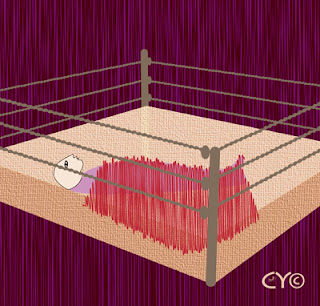The Dream: I’m in a foreign country. A woman is digging in a
sandy spot, with water puddling in the hole as she digs. The location is a city
square. It isn’t green, with trees and grass, but more like a European town
square with packed sandy earth. At one
point I hear that we are in Mesopotamia, and at another
that we are in a Mediterranean country.
I watch the woman dig; her action seems inappropriate,
considering how she is dressed and her age: she’s middle class and middle aged.
I become excited and say, “When I lived in England I wrote a novel, and I got
the idea for it doing what you’re doing: I was digging with my children.”
Clark says, “You can often find
artifacts.” He begins to dig in or near the woman’s spot and in short order
extracts a circular clay piece with what appears to be a primitive god in the
center. I wonder if we can keep this interesting object or whether we are
legally required to turn it in. I want it.
Later we are sitting at a table, the three of us. Clark
is to my right; the woman to my left. When Clark passes
the artifact to me I plan to slip it into my carrier bag. He hands it to me,
but rather than the clay sculpture it is a picture of the artifact on shiny
photographic paper, with a list of the god’s attributes to the right. There are
four, and the 3rd one is “empathy.”
“Empathy?” I think.
“That’s an odd trait for a primitive god.”
Interpretation: Something is coming up from underneath. The
puddling water tells me that unconscious material is coming to the surface. To
start, let’s take a look at the geometric symbols in this dream: there’s the
city “square,” the round clay artifact and the square table where we later sit.
The square and the circle are both symbols of what Jung calls the Self, in other words, the
combination my consciousness (what I’m aware of) and my unconscious (what I’m
unaware of thinking or feeling). Dream are road maps, telling us where we are on
the path to individuation, another
Jungian term for the process of incorporating our unconscious material into our
conscious awareness.
The middle aged woman is me, digging into my dreams and
bringing unconscious material to the surface. When I am joined by my husband
Clark (my other half) and my children (the curious, experimental, engaged parts
of myself) an artifact (a long-buried, but new to me, part of myself) quickly
appears. This is something I want, even though I have some qualms about my
right to have it.
Later, at the table (have the gifts from the unconscious
been tabled?), I plot to steal the artifact. But I can’t do it. It turns into a
representation of itself, becoming as ephemeral as the dream that engendered
it. But it does have a message for me,
“Empathy.”








